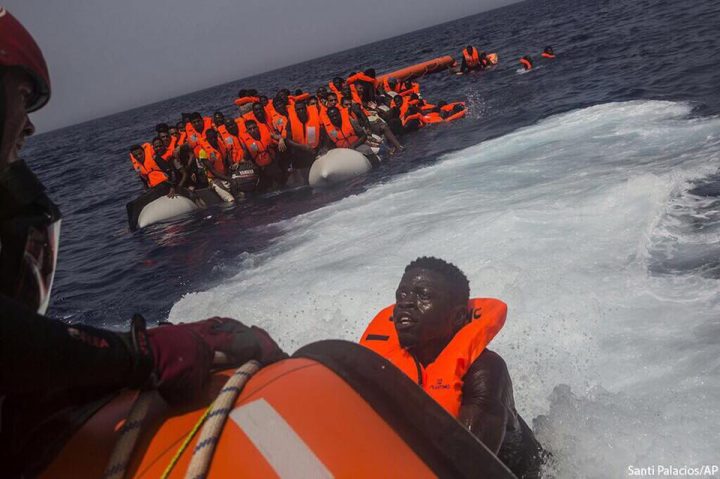Geographical and historical reasons make Italy the Mediterranean’s centre of gravity. The country has been the meeting point for civilisations – both past and present – that border Mare Nostrum. Those same reasons mean that Italy is today a natural landing point, both actual and potential, for those seeking to reach Europe from Africa or the Middle East. This influx is unlikely to end without making the areas and communities on the southern and eastern sides of the sea more volatile and dangerous. Despite this, Italy has for some time abandoned its position as a bridge into the continent and adopted the role of barrier. It has even “closed its ports” to castaways narrowly saved from drowning.
Italy has assumed this role in the name of the European Union whose governments are perfectly happy for Salvini to berate them as long as he takes responsibility on their behalf – either directly or through the Libyan gangs he finances – of keeping castaways far from Europe’s borders. But this role of hit-man makes Italy a brutal and insignificant country. The course that its government has set moves Italy away from its centre of gravity and towards those countries in eastern Europe who are at the forefront of boasts about the war that Europe is unleashing against migrants. It is here that Italy’s governing parties find consensus for their position.
Instead, Italy could take centre stage in the rebuilding of a great Euro-Afro-Mediterranean community thanks to the arrival of many people retaining links to their origins: the communities and land they have left behind. Those links are maintained by family relationships but also by the internet and potentially, if it were permitted, by the ease of travelling between the country of destination and origin – tens to hundreds of times less costly than what they are forced to pay for one-way journeys that expose them to unspeakable violence and the ever-present risk of losing their life.
Those making these journeys are for the most part, the youngest, most enterprising, dynamic, curious and generous in their communities. However, in Italy and Europe we do not know how to appreciate and value these qualities or migrants’ potential and culture, so we dismiss them, relegating them to the lowest rung in society. At times, this is so they can be exploited all the more easily and paid less. In other cases, this pushes them towards criminality as hired labour. They are regularly used as bogeymen to unite people around the fear of “contamination” by an element foreign to our perception of ourselves, as if the population of Europe was not the (positive) result of centuries of cross-contamination between different people and cultures…
And therefore, new arrivals to Italy are denied the chance to participate usefully in society because “there’s not enough work” even for native Europeans. This suggests that the amount of work is always fixed, and not something that expands or contracts based on what we set out to accomplish (a decision made solely by the world’s ruling classes). We therefore get distracted by the deadly myth of “growth” and move as one towards a cliff edge where climate change will render the earth uninhabitable.
And in order to keep migrants far away, we submit to ever more authoritarian, if not fascist, regimes and turn our backs on the contribution that everyone – natives and migrants – could make to ecological conversion. This conversion could take place not only in Europe or in those countries migrants hail from but throughout the world we all share in common.
In order to bring about the radical change that is necessary to combat climate change, we need a great European and worldwide movement that will sweep away governments clinging to the preservation of a way of life that is leading us towards catastrophe. But that’s not all. The countries and communities that refugees and migrants are from need people who can steer them towards restoring peace and harmony to their nations. They also need projects to regenerate the land, territories and communities devastated by centuries of exploitation aided by governments serving those who have carried it out.
The only people who can do this are migrants willing to either return voluntarily to their countries (which includes almost all migrants) or re-establish new forms of grassroots-led collaboration with the communities they have been forced to leave. This could be through ideas, projects, relationships or even small sums of capital (which would go a long way). No one else can do this; calls to “help them at home” – which, for the most part, hide the desire to get rid of migrants as quickly as possible – ignores the continued presence and arrival of new migrants to European countries, and is pure hypocrisy.
But today, a movement is forming which is calling out the politics and governments that prioritise pushing back migrants over adapting urgent and drastic measures against fossil fuels and their industry which is leading the planet towards catastrophe. This is a movement taking shape among the youngest generations, those whose future is most affected by the apathy of the “ruling classes,” and one which will not and cannot stop, precisely because it is crucial to the very existence of those taking part. Under the name of Greta Thunberg, this movement that is gaining momentum should find in the migrants that European governments have made enemies, allies in their fight to radically change the world.
Translation from Italian by Malcolm Gilmour










